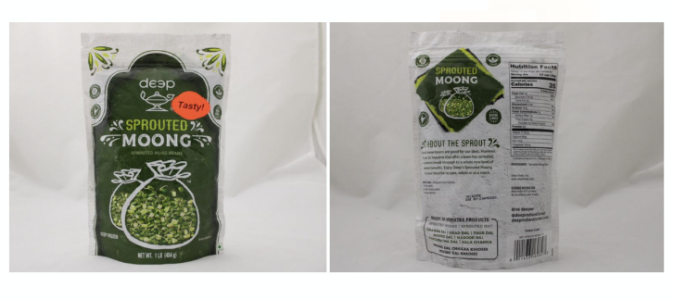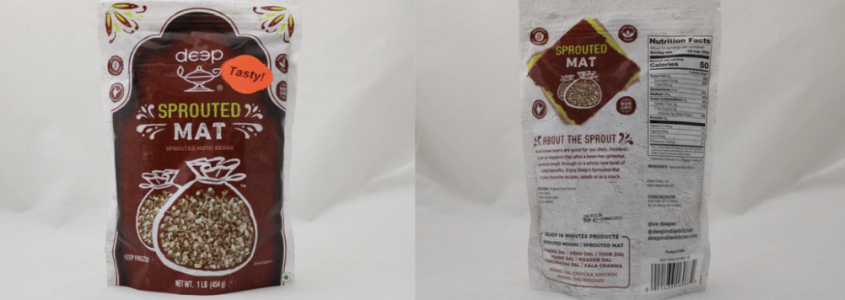Frozen sprouted beans recalled after salmonella outbreak—check your freezer now
By
Veronica E.
- Replies 0
If you’ve got frozen veggies stocked up, now’s a good time to double-check your freezer.
Health officials are warning consumers across the US to check their frozen food after a salmonella outbreak triggered a nationwide recall of certain sprouted bean products.
At least 11 people across 10 states have gotten sick, and several have been hospitalized.
The recalled items may still be sitting in home freezers, so it’s important to know what to look for.
Here’s what you need to know to stay safe and protect your household.

Outbreak traced to frozen sprouted beans
The Centers for Disease Control and Prevention (CDC) and the Food and Drug Administration (FDA) are investigating an outbreak of salmonella linked to Deep brand frozen sprouted moong beans and sprouted moth beans.
Distributed by Chetak New York LLC, these products have been sold across the country and may still be in household freezers.
As of the latest update, 11 people in 10 states have reported illness, with four requiring hospitalization.
While no deaths have been reported, the CDC is urging the public to take the recall seriously and to avoid consuming the affected products.
Also read: Nationwide recall for a popular deodorant—could yours be among them?
Which products are being recalled?
Check your freezer for the following recalled items:
Look on the back of the bag for these lot codes: 24330, 25072, 25108, 24353, 25171, 24297, 25058, 25078, 24291, 25107, 24354, and 24292.
If you have any of these products, do not eat them—dispose of them safely or return them to the store for a refund.
Also read: Unexpected hazard found in popular yogurt—recall issued over plastic contamination
What to do if you find the recalled beans
First and foremost, don’t take any chances.
Even cooking the beans may not eliminate the risk, since salmonella bacteria can survive under certain conditions.
The CDC recommends throwing the beans away or returning them to the store, and thoroughly cleaning any surfaces, containers, or utensils the beans may have touched.
Use hot, soapy water—or run items through a dishwasher to ensure proper sanitation.

Also read: A major recall just dropped—what drivers need to know now
Why sprouted beans are a common concern
Sprouted beans are known for their crunch and nutritional value, but they also carry a higher risk of bacterial contamination.
That’s because the warm, humid environment needed for sprouting also encourages the growth of harmful pathogens like salmonella and E. coli.
This risk applies to both fresh and frozen sprouts, especially for vulnerable groups.

Also read: Double recall alert: FDA flags health risks in popular seafood items
What you should know about salmonella
Salmonella is a bacteria that can cause serious gastrointestinal illness.
While most healthy individuals recover on their own, the infection can be dangerous for older adults, young children, and those with weakened immune systems.
Common symptoms include:
If symptoms are severe—especially if they include dehydration, confusion, or a high fever—seek medical attention immediately.
In rare cases, salmonella can lead to complications like bloodstream infections or joint pain.
Also read: Food safety alert: Packaging error in popular snack triggers precautionary recall
How did the contamination occur?
The issue was flagged during routine FDA testing, which identified contamination in some of the frozen bean batches.
In response, Chetak New York LLC has halted production of the affected items while further investigation is underway.
Tips to avoid foodborne illness in the future
Food recalls are a good reminder to check your freezer and stay informed.
If you have the recalled beans, it’s safest to throw them out or return them.
A quick cleanup now could help prevent a serious health issue later.
Read next: Recall notice for a favorite cereal—did you buy the affected batch?

Whether you’ve experienced a foodborne illness yourself or just want to keep your kitchen safer, we’d love to hear from you. Share your stories, tips, or questions in the comments. Staying informed helps us all protect our health—and each other.
Health officials are warning consumers across the US to check their frozen food after a salmonella outbreak triggered a nationwide recall of certain sprouted bean products.
At least 11 people across 10 states have gotten sick, and several have been hospitalized.
The recalled items may still be sitting in home freezers, so it’s important to know what to look for.
Here’s what you need to know to stay safe and protect your household.

A helpful reminder to check your freezer for recently recalled frozen products. Image Source: Pexels / Lucie Liz.
Outbreak traced to frozen sprouted beans
The Centers for Disease Control and Prevention (CDC) and the Food and Drug Administration (FDA) are investigating an outbreak of salmonella linked to Deep brand frozen sprouted moong beans and sprouted moth beans.
Distributed by Chetak New York LLC, these products have been sold across the country and may still be in household freezers.
As of the latest update, 11 people in 10 states have reported illness, with four requiring hospitalization.
While no deaths have been reported, the CDC is urging the public to take the recall seriously and to avoid consuming the affected products.
Also read: Nationwide recall for a popular deodorant—could yours be among them?
Which products are being recalled?
Check your freezer for the following recalled items:
- Deep Sprouted Moong (Mung) Beans, 16-ounce bags
- Deep Sprouted Mat (Moth) Beans, 16-ounce bags
Look on the back of the bag for these lot codes: 24330, 25072, 25108, 24353, 25171, 24297, 25058, 25078, 24291, 25107, 24354, and 24292.
If you have any of these products, do not eat them—dispose of them safely or return them to the store for a refund.
Also read: Unexpected hazard found in popular yogurt—recall issued over plastic contamination
What to do if you find the recalled beans
First and foremost, don’t take any chances.
Even cooking the beans may not eliminate the risk, since salmonella bacteria can survive under certain conditions.
The CDC recommends throwing the beans away or returning them to the store, and thoroughly cleaning any surfaces, containers, or utensils the beans may have touched.
Use hot, soapy water—or run items through a dishwasher to ensure proper sanitation.

Frozen sprouted beans recalled due to potential salmonella contamination, affecting products sold nationwide. Image Source: FDA.
Also read: A major recall just dropped—what drivers need to know now
Why sprouted beans are a common concern
Sprouted beans are known for their crunch and nutritional value, but they also carry a higher risk of bacterial contamination.
That’s because the warm, humid environment needed for sprouting also encourages the growth of harmful pathogens like salmonella and E. coli.
This risk applies to both fresh and frozen sprouts, especially for vulnerable groups.

Check your bags—these recalled sprouted beans may pose a health risk if still in your freezer. Image Source: FDA.
Also read: Double recall alert: FDA flags health risks in popular seafood items
What you should know about salmonella
Salmonella is a bacteria that can cause serious gastrointestinal illness.
While most healthy individuals recover on their own, the infection can be dangerous for older adults, young children, and those with weakened immune systems.
Common symptoms include:
- Fever
- Diarrhea (which can be bloody)
- Nausea and vomiting
- Abdominal cramps
If symptoms are severe—especially if they include dehydration, confusion, or a high fever—seek medical attention immediately.
In rare cases, salmonella can lead to complications like bloodstream infections or joint pain.
Also read: Food safety alert: Packaging error in popular snack triggers precautionary recall
How did the contamination occur?
The issue was flagged during routine FDA testing, which identified contamination in some of the frozen bean batches.
In response, Chetak New York LLC has halted production of the affected items while further investigation is underway.
Tips to avoid foodborne illness in the future
- Stay up to date on recalls: Visit the FDA and CDC websites for regular updates on food safety alerts.
- Practice safe food handling: Always wash hands, surfaces, and utensils after handling raw or frozen produce.
- Be careful with sprouts: If you’re in a high-risk group, consider skipping raw sprouts altogether or cooking them thoroughly to reduce the risk of infection.
Food recalls are a good reminder to check your freezer and stay informed.
If you have the recalled beans, it’s safest to throw them out or return them.
A quick cleanup now could help prevent a serious health issue later.
Read next: Recall notice for a favorite cereal—did you buy the affected batch?
Key Takeaways
- A nationwide salmonella outbreak has been linked to Deep brand frozen sprouted moong and moth beans, prompting a recall by Chetak New York LLC.
- The affected beans were sold in 16-ounce bags with specific lot codes printed on the back of the package.
- Consumers are urged to discard or return the products and disinfect any kitchen items that came into contact with them.
- Salmonella symptoms include fever, diarrhea, nausea, and cramps, and can be serious for older adults and those with weakened immune systems.
Whether you’ve experienced a foodborne illness yourself or just want to keep your kitchen safer, we’d love to hear from you. Share your stories, tips, or questions in the comments. Staying informed helps us all protect our health—and each other.






